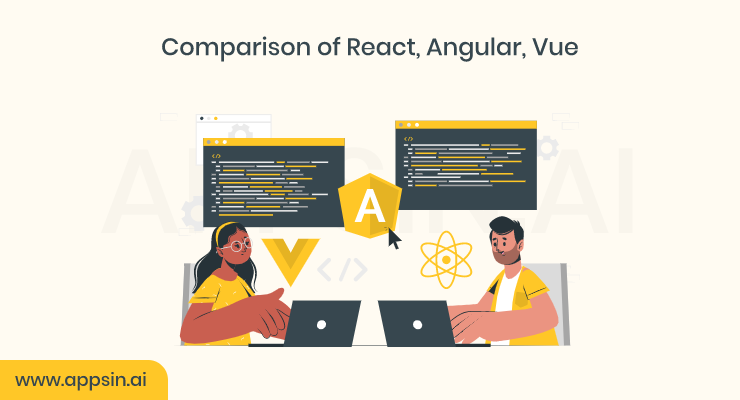Choosing the Best Front-End Language: A Comprehensive Comparison of React, Angular, Vue, and JavaScript
- Author: Princee Rithikka
- Posted On: August 2, 2023
- Post Comments: 0
| Getting your Trinity Audio player ready... |
Table of Contents
ToggleChoosing the Best Front-End Language: A Comprehensive Comparison of React, Angular, Vue, and JavaScript
In the ever-evolving world of web development, choosing the right front-end language can be an overwhelming task. With so many options available, developers often wonder which one is the best fit for their projects. In this blog post, we'll embark on a journey to explore four of the most popular front-end languages: React, Angular, Vue, and JavaScript. By looking at their features, strengths, and weaknesses, we aim to help you make an informed decision about which front-end language suits your needs best.

JavaScript
Before delving into the frameworks, it's vital to understand the foundation on which they're built - JavaScript. JavaScript, as a primary front-end language, serves as the foundation for interaction, animations, and dynamic content on webpages. It has withstood the test of time and remains unparalleled in its versatility. Developers can create highly customized solutions without the overhead of a framework by using plain JavaScript.
Strengths
- • Ideal for smaller projects or those requiring minimal dependencies.
- • It is universally supported across all modern browsers.
- • It offers full control over the application's behavior and structure.
Weaknesses
- • JS requires manual handling of DOM manipulation and state management.
- • It can lead to complex and harder-to-maintain code for large-scale applications.
React JS
React.js is a popular and widely used JavaScript library for building user interfaces. It was developed in 2013 and is maintained by Facebook and a community of individual developers. React.js is widely used to create interactive and dynamic web applications with a focus on reusability, modularity, and efficiency.
Strengths
- • SEO-friendly due to server-side rendering possibilities.
- React Developer Tools is a Chrome extension for quick UI edits and React application monitoring.
- • React utilizes Virtual DOM for efficient UI updates, improving performance compared to traditional DOM manipulation.
- • React supports unidirectional data flow, making it easier to track application state and manage components.
- • React's active community offers numerous libraries, tools, and resources for developers to enhance productivity.
Weaknesses
- • Frequent updates might lead to version compatibility issues.
- • React's learning curve can be steep for beginners.
- • React lacks an official routing solution, requiring third-party libraries like React Router for client-side routing.
- • React application development may involve complex setup and configuration due to boilerplate code.
Angular JS
Angular.js, initially launched by Google in 2010, is a well-known open-source JavaScript-based application framework. It is designed specifically for the development of dynamic web apps and to solve issues while creating single-page applications. Angular is an extensive web application frontend framework that is free and relies on TypeScript. It is quick to develop, simple, and communicative. Given that no other libraries are required, it is perfect for complex applications.
Strengths
- • Google offers extensive documentation and official support.
- • Complete solution with a logical structure and solid features.
- • Two-way data binding simplifies real-time UI modifications.
- • A user-friendly interface that enhances business efficiency.
- • Integrating TypeScript improves type safety and code structure.
Weaknesses
- • Larger bundle sizes can have an impact on initial loading times.
- • Frequent updates can require extra effort in order to keep up with the latest practices.
- • A steeper learning curve, especially for TypeScript newcomers.
- • If you don't use framework-specific tools or libraries, AngularJS has restrictions that might add time and burden to a developer's task.
Vue JS
Vue.js has quickly gained recognition because of its progressive nature, which allows developers to incorporate it progressively into existing applications. Vue finds a balance between React and Angular because of its straightforward and easy-to-understand syntax. It is said to be suitable for developing single-page apps. It is a lightweight framework that is simple to use and quick to execute.
Strengths
- • It is quick to set up and faster than any other framework.
- • It leads to better code maintainability and reduces bugs with its simple and easy coding.
- • It has a smaller bundle size and better performance compared to Angular.
Weaknesses
- • It has limited official backing compared to React and Angular.
- • It has a smaller ecosystem compared to React and Angular.
- • May face challenges with long-term maintainability for very large projects.
How do you choose the right JavaScript framework for your project?
Choose React.js:
- • For building reusable and modular components
- • If your project demands a large and active community
- • When you are aiming for SEO-friendly applications
- • When you require high-performance rendering and efficient updates
Choose Angular.js:
- • When you are building large-scale applications
- • If you need official support from Google and a well-maintained ecosystem
- • If you need a framework with a clear and structured architecture
- • If you prioritize two-way data binding
Choose Vue.js:
- • If you prefer a progressive framework that allows incremental adoption.
- • If you prioritize beginner-friendly syntax and developer-friendly documentation.
- • When your project requires a smaller bundle size and better performance.

